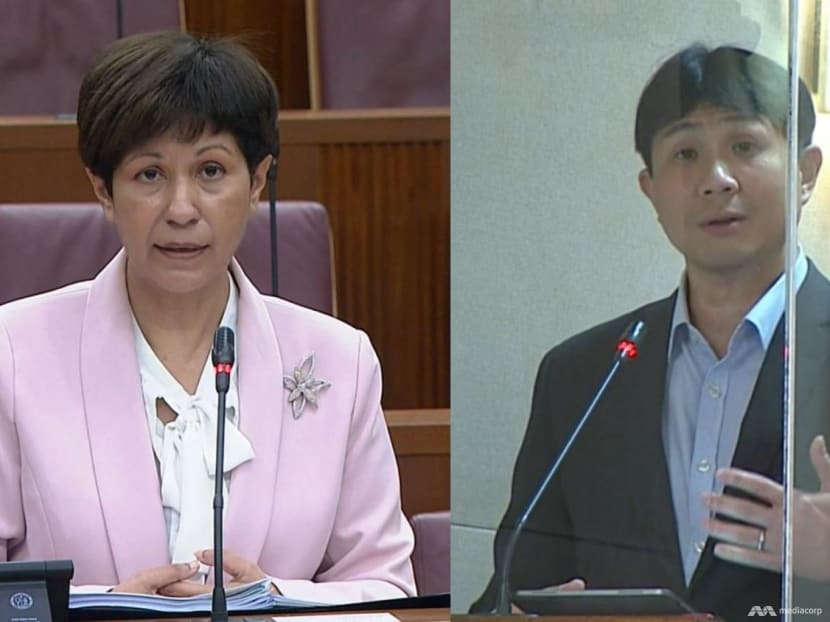Government not against taxing wealth, but policies should be practical and effective: Indranee Rajah

Second Minister for Finance Indranee Rajah (left) and Associate Professor Jamus Lim (WP-Sengkang) in Parliament on Nov 1, 2021.
SINGAPORE: The Government is not against taxing wealth, but such policies should be practical and effective in a way that the rich cannot avoid them easily, Second Minister for Finance Indranee Rajah told Parliament on Monday (Nov 1).
Ms Indranee was responding to an adjournment motion raised by Member of Parliament Jamus Lim (WP-Sengkang) on the need for Singapore to consider more types of wealth taxes.
“The question has never been one of whether we want to tax wealth, but a practical one of how to do so effectively such that it cannot be avoided easily,” she said.
“So, at the end of the day, I think we don't have any issue with wealth taxes per se. We just want to make sure that whatever we put in place actually works.”
This comes after Finance Minister Lawrence Wong said on Oct 15 that Singapore continues to study how it can expand its wealth tax system in the face of key challenges such as inequality and climate change.
Singapore currently imposes property tax but not other types like a property gains or inheritance tax. These are different from a general wealth tax, which involves trying to value different assets.
DIVERSIFY REVENUE, FIGHT INEQUALITY
In his adjournment motion, Associate Professor Lim said wealth taxes could improve the diversity of the Government’s revenue sources, and help manage societal problems that result from rising inequality.
He called income inequality in Singapore a "problem", pointing to how the country’s Gini coefficient – which measures unequal distribution of income or wealth – after redistribution puts it at the top of the inequality scale, comparable to the United Kingdom and United States.
Assoc Prof Lim listed a few options Singapore could explore to remedy this, including reintroducing the inheritance tax, although he noted there are concerns this could weaken the country's value proposition as a wealth centre.
Another option would be to make estate duties more progressive, such as by imposing another tier for higher-value properties, he said.
Assoc Prof Lim also proposed introducing a general tax of 0.5 per cent on net wealth in excess of S$10 million, 1 per cent above S$50 million and 2 per cent above S$1 billion.
He added that this tax could be designated to a special-purpose foundation, mandated to exhaust its entire endowment, with payouts allocated towards government-approved uses that are “consistent with national priorities”.
Taxation could also be restricted to instances when net wealth gains are positive, suggested Assoc Prof Lim.
Noting that Singapore has had experience with other forms of wealth taxes in the past, he added that it should not fear risking its competitive position, as other jurisdictions have already moved ahead with similar taxes on capital.
“More generally, we need to disabuse ourselves from the mistaken notion that low taxes offer the most competitive advantage for our status as a global financial centre.”
Citing a PwC report that showed low taxes were not among the top factors that made Singapore an attractive place for asset and wealth management, Assoc Prof Lim said: “Tax competition is a mindset more suited for the 20th, rather than 21st, century.”
TAXING IN A “COMPETITIVE WAY”
In her response, Ms Indranee disagreed with Assoc Prof Lim’s suggestion that companies might no longer look at tax rates, stating that this cannot be discounted completely.
“And it must be remembered that wealth can move. Talent, both Singaporean as well as foreign, can move. Companies can move,” she said.
“So we have to tax in a way that is competitive, and allows people and companies to generate revenue in order to encourage them to stay here, and that revenue then can be used and reallocated and redistributed.”
Ms Indranee also spoke on Assoc Prof Lim’s comments about how the goods and services tax (GST) affects lower- and middle-income groups disproportionately more, calling it a line that the Workers’ Party repeats “very often”.
Ms Indranee said that the GST system was designed to be tilted towards helping the middle- and lower-income, pointing to schemes such as GST vouchers and the S$6 billion Assurance Package to see these groups through the tax hike.
“To be fair, it is very important to also look at what we do to support and buffer the middle- and lower-income in order to take away any of the additional burden that falls on them as a result of GST, and in that way we make it a fairer system,” she said.
STRIKING THE RIGHT BALANCE
Nevertheless, Ms Indranee said the Government “is not in disagreement” with Assoc Prof Lim in that it is constantly looking for ways to supplement its revenue, but noted that this has to be done in a way that “strikes the right balance”.
“So on wealth taxes, it is not about having more types of wealth taxes per se. Rather, what matters is having wealth tax policies that work in the context of each jurisdiction,” she said.
For instance Ms Indranee pointed out that Switzerland, another wealth management hub with a net wealth tax, estate duty and property-related tax, has a wealth tax revenue of about 1.9 per cent of gross domestic product (GDP).
This is comparable to Singapore's wealth tax revenue, which is at about 1.8 per cent of its GDP, she said, adding that Singapore will continue to review wealth tax.
Ultimately, Ms Indranee said Singapore has a tax system that is fair, with those who have more contributing more.
“It is dynamic as it places a low tax burden on workers in businesses and allows them to retain the fruits of their labour,” she added.
“We care about competitiveness not for the sake of competitiveness, but to promote growth for the benefit of all, and it is sustainable, both fiscally and environmentally.
“This is what a well-designed 21st century tax system should look like, and we will continue to refine it to make it even better.”









